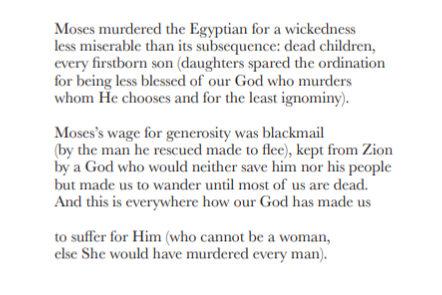Articles/Essays – Volume 48, No. 1
Broken Vessels: A Series
A series of six found poems derived from “Agency, Disability, and Atonement” by J. Mark Olsen.
I. Sunday School Psychotherapy for the Bipolar: a found poem with Daddy issues
He is a good parent. But there is not enough space
in the boat for all of us heroic cowards. I need an excuse.
Some are left in the psychological current, bound
in Kantian irons and a counterintuitive duty to live.
I struggle against the force of God’s headwind,
blown by the irrational weight of his belief
in divided kinds of persons. He demands these
differences: good and skew, level and mood, function
and desire. I want to be committed, but the delusional
damage is deep. It undercuts a moral stem, and atonement
is a drag. It takes a psychiatric Christ to repair disordered reason—
a borrowed weight to hold our bodies under, to heal
the subtle spots on our reality, the flaws of internal experience.
We need a physician against our false sense of rational acts,
against the opposition of a parent incapable of seeing His
mistake; blind to the suffering attempts of all His broken children.
II. Kantian want ad for the ideal Mormon robot
Required:
complete persons
who know they are greater
than others, separate,
differences clearly obvious.
Those neatly labelled,
deserving of praise, sense
damage, avoid others
with questionable family
history, social flaws,
and poor genetics.
Whatever the difficulty—
filling their natural born character,
as a matter of duty, and contempt
for excuse.
Strong all-or-nothing persons,
do not break down, know the way
to flip the switch on mental snap,
face death—choose life.
Finished persons keep their word
will not abuse Christ with weakness
are rationally categorical
fulfill obligations
and responsibility
and responsibility
and responsibility
with no need to be forgiven.
Good agents should answer
by writing a profound letter.
III. Intuitively wrong action
Persons depress some tasks
some tasks
some tasks
simply impossible. But then,
much more much m ore
much mo re
difficult, without im po ssible
imp oss ible
imp ossib le. For instance, that person
pers on
p er son
that person with
a severe moral ob ligation to a let ter
of th anks than ks
of thanks to
a letter to a fri end.
Further that the letter po ssib le
p oss ible
pos s ib le
poss ib le
po ssible for this agent,
but only just.
Ag ency
Agen cy
a gen cy AGENCY.
in this case, might well restrict
altogether
the letter.
The LE TT ER
the LET TER
l et te r
possible,
but very, very difficult.
IV. Disabled Reason’s second attempt at writing a letter
Friend, I give my word I am only just writing, radically constrained by the faces. Their contempt. How they stare because the saintly way exists in me. I am full of phenomenon, and they see. See all the weight of the second notion of roots? How the body does not break? I blame it on the rough calculation—the causes and the literal two-word continuum. I am writing. We are not limited by relevant history. The real elements further the purposes of the irrelevant interpretation, the labor of children born—brothers and sisters. We are all related to the literal hold of the body of the household, all in the family way, and we point to the heavy spots. What is right, Friend? I am writing this bit of soul making. The attempts not limited to ends of existence, to flaws that want to leave to body. I am locked in impossible outcomes. I see you struggle against the severe surrounding, the forces of sin—reflection. I see you. I see, Friend. It is as I say.
V. God speaks for Himself, for Lehi, and for Kant
Some might be bothered that I could be
interpreted as confusing. But I am
the problem of space and time restrictions.
The I AM nomenclature limited
by empirical objects, the “ought.” There is
no reflection; no “we” in the suggestion.
What can a moral God do? The obvious:
more and less. I weaken my infinite ability,
advocating the cultivated struggle
in a covenant demographic, creating types,
a history of “oughts,” and certain kinds
of misguided mental tasks, however I must
to mitigate my children’s agency, to get them
to safety. I hold this responsibility—
the commitment to opposition. That is
my reason. That is my end.
VI. Christ contemplates atonement at the helm of the ship
How does one will to rise against this body experience?
I have reason to question my ability to keep my word.
From here the way does not seem clear.
We struggle, a family altogether blind, bound
in certain death and blown on a severe current.
I take up the least of God’s issue, and the greater—
brothers and sisters in reflection and all degree of character
—and we hold on. My duty, to keep course, maintain
a mild state of hope, but some are more afraid
to get into the boat than others. The evil is deep.
I have struggles of my own—a potential global loss;
difficulties making sense of this planning
even before the suggestion of the other
above self. But the tremendous history of need—
the outcomes of these lost children more relevant
than all my weaknesses. It is hard to do the heavy act
of healing—the unforgiving attempts necessary to give
life, to make claim on the demands of their agent bodies,
separate sin from the soul, repair the absurd suffering
of madness to save purpose.
Entirely difficult if not impossible. I point this boat of empathy
from captivity. I think I can see the way. By the time
it is finished we will arrive in more certain surroundings
as one, an equal household—all of us justly broken.


 Back to full Issue
Back to full Issue

